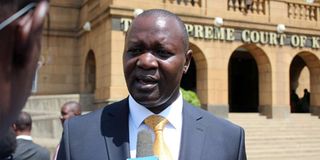Tom Ojienda, Nairobi County duel over Sh156m legal bill

Senior Counsel Tom Ojienda.
Former Law Society of Kenya chairman Prof Tom Ojienda and the Nairobi County government are embroiled in a court battle over a Sh156 million bill for legal services he offered eight years ago.
The bill arose from an industrial court case pitting the county government against the Kenya Local Government Workers Union.
The case involved the implementation of a collective bargaining agreement valued at Sh10.4 billion.
Prof Ojienda says in court documents that he was hired on August 30, 2013 to represent the county by filing a petition to stop planned industrial action by the union.
He successfully obtained orders stopping the workers’ intended strike and the matter did not proceed to a hearing.
The county argues that no other instructions were issued to the lawyer and therefore he is not entitled to the Sh156,729,206 that he claimed in a November 27, 2017 bill.
On November 10, 2020 High Court deputy registrar and principal magistrate Alex Kyanya whittled down the costs to Sh448,328.
Prof Ojienda then moved to the labour court to have the magistrate’s decision set aside on the grounds that there was a misdirection amounting to an error in law.
In reducing the bill, Prof Ojienda argues, the magistrate ignored the value of the subject matter. He says the instructions fee was modest and pegged on the amount of Sh5 billion.
Justice James Rika set aside the magistrate’s decision and the dispute was sent back to the magistrate’s court for a fresh hearing by a different deputy registrar.
Justice Rika said it was wrong for the county government to argue that the dispute was about a strike with no quantifiable monetary value for the subject matter.
“The prayers in the amended Statement of Claim show that the instructions given to the advocate went beyond stoppage of the strike,” he noted.
“The application was not made in isolation. It was meant to obtain interim measures stopping the strike, before the substantive dispute could be heard.”
He observed that the main dispute was about the implementation of a CBA negotiated between the parties and registered with the Industrial Court, with a known value given to that CBA.
“This was an economic dispute. The value of the subject matter in an economic dispute is known or knowable. It cannot be said that the value cannot be determined,” he said.
“CBAs are negotiated and concluded based on hard figures, with hard-nosed economists at the centre of collective bargaining processes.”





